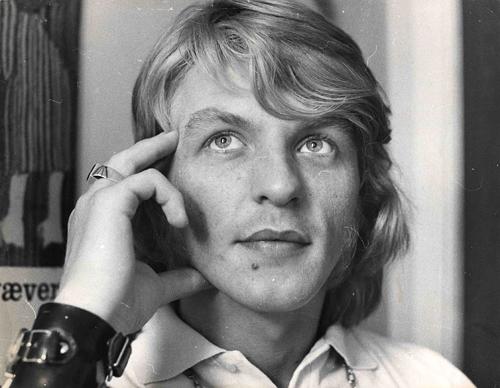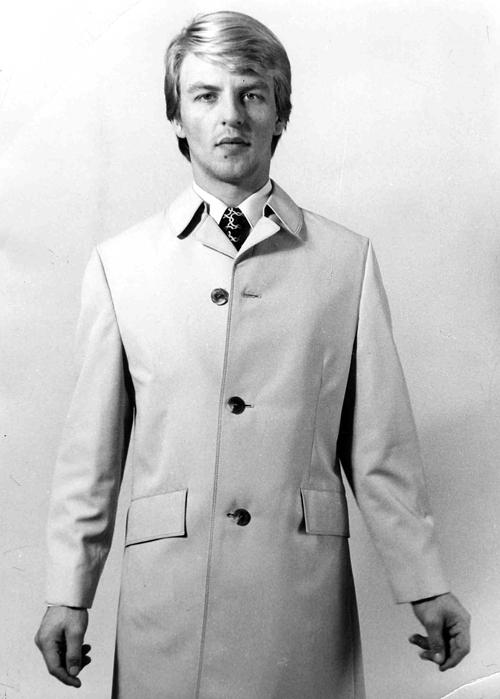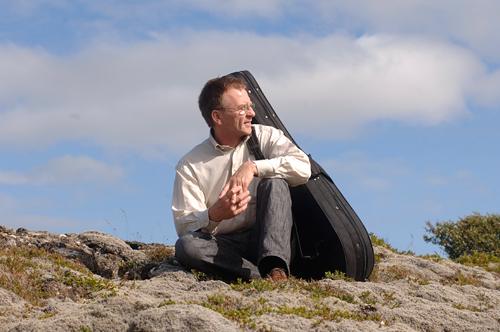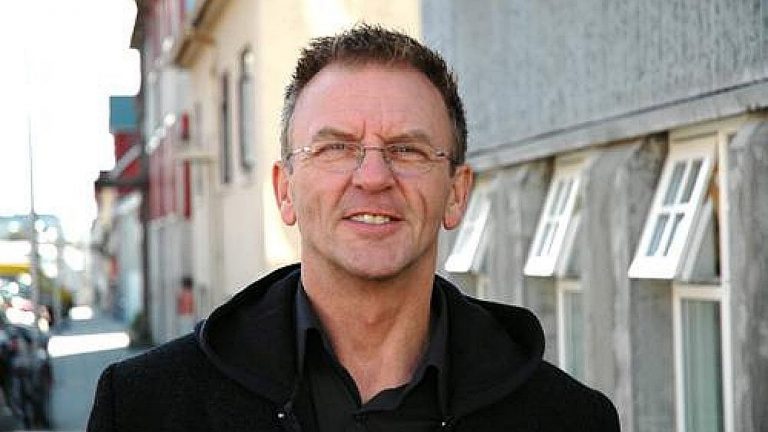The National Queer Organization, Samtökin ’78, celebrates it’s 40th anniversary today, on May the 9th. It’s founding 40 years ago was down to one single man who after contemplating suicide decided to fight for his own and others rights as gays.

His name is Hörður Torfason, a well-known singer/songwriter, actor and stage director in Iceland. He held the first meeting is his own flat in Reykjavík on May 9th in 1978 and twelve people attended. Hörður and Samtökin ’78 have come a very long way since that night, how is he feeling about his “baby” 40 years later?
“I’m not thinking much about these matters anymore, to be honest,” says Hörður. “After the new law in 2006 granting gay people equal rights in every aspect my goal is reached and what I had in mind when I started has come to pass one hundred percent. I was forced to leave Samtökin ’78 dued to conflicts in 1993 and since then I have not been active in the organization. Of course I will always be the one who started it all, and in my own way I’m proud of that.”
When Hörður came out to his parents, when he was 21 years old, he says that they urged him to be himself and never try to hide who he really is. That was easier said than done in the early 70s. The gay scene in Iceland was practically none existent and even though there were a few guys everyone knew were gay it was not talked about openly.
“I have sometimes said that at that time men were only gay on weekends,” says Hörður with a laugh. “Then they went to the bars and got together but it was all very sub rosa and you had to be a master of the coded language they used to understand what was going on. I found it very funny at that time and I didn’t really understand why it had to be like that. I didn’t walk around announcing that I was gay but if anyone asked I told them. I never tried to hide it from anyone.”
“I was assaulted, both physically and verbally almost every day, and some guys were afraid to walk with me down the street because then people would think that they were gay too.”
Hörður says that soon after he came out he started talking about forming some sort of organization to fight for gay rights and make homosexual people more visible in society, but no one thought that was a good idea.
“They just laughed at me,” he says. “It was looked upon as a crazy idea and I soon gave up trying to convince other gays to fight for our rights. At that time I was starting to be known as a singer and stage director all over Iceland and my homosexuality was met with furious reaction from many people. I was assaulted, both physically and verbally almost every day, and some guys were afraid to walk with me down the street because then people would think that they were gay too.”
In 1975 an Icelandic men’s magazine called Samúel published an interview with Hörður where he openly discussed his homosexuality and all hell broke loose. Hörður became persona non grata, could neither get work nor rent an apartment and soon after the interview was published he fled the country and moved to Copenhagen.
“I was going to kill myself,” he admits. “I didn’t see the point of living like a hounded animal for the rest of my life. I turned on the gas, taped over all cracks and was ready to die. But then something happened inside myself. I realized that I was a young talented man who had every right to live and nourish my talents. And I decided to fight for that right any which way I could. I wasn’t intent on letting the injustice win.”
Having made this decision Hörður moved back home to Iceland in the autumn 1977 and started preparing the ground for founding a organiztion to fight for gay rights.

“I mostly worked alone for many months because the others just thought I was crazy trying to put this idea into action. But early in the year 1978 I got in touch with Guðni Baldursson, who became the first chair of Samtökin ’78, and things started to roll. Guðni was very well-connected to what was happening in these matters in other European countries, and together we started forming how we should do this. We talked to other gays and I tried to get in touch with some lesbians but they were even better hidden than the gays so in the end I was only able to get two of them to attend the first meeting. Not all the guys were happy about them being there, but I didn’t listen to them. It was always my aim to make Samtökin ’78 a human rights organization for all homosexual people.”
Samtökin ’78 did not get much support in the society to begin with but little by little it gained ground and the support of some forward thinking politicians. Hörður says that he left that part of the work mostly to Guðni, as he himself hates meetings and endless discussions about the same topics. On the other hand he represented the organization in society at large and in the media, went to interviews in the radio and some of the papers and to his delight that seemed to have a good effect.
“I was always adamant that we had to be visible in society,” he states. “That was one of the most important things. At that time I did a lot of stage directing for amateur theater groups in the countryside and me and Guðni joked between ourselves that he should cover the Reykjavík area and I the rest of the country.
Everyone in Iceland knew me by then and I made a point of walking around these small towns and make sure that people noticed that in spite of being gay I was just a normal guy. I also did some interviews with the radio and it made me extremely happy when people came up to me later and told me that those interviews had changed their lives.
I remember particularly one woman who told me years later that when she heard me on the radio, one night when she was doing the dishes in her house as a married woman with family, she had thrown away the rubber gloves she had on and said aloud to herself: ‘This is it! I’m through with pretending. I want to live my life as who I really am.’ And then she left her husband and announced to the world that she was indeed a lesbian and always had been.”
“Some gays are irritated about the fact that Samtökin ’78 is now concentrating on what needs to be done to get other groups … equal rights and claim that it has forgotten the gays and lesbians, but I think that is a natural evolution in organisations like this.”
As the years passed the landscape started to shift and one by one the goals of the organisation were reached. When did things really start to change for the better for queer people in Iceland in Hörður’s opinion?
“I can tell you exactly when that happened!” he exclaims. “That was mostly thanks to the internet becoming available for everyone. In 1995 I started a chat room for gays where they could talk to each other incognito that things really started to happen. It made a huge difference to be able to talk to other gays in save environment and without fear, without having to go to a meeting that everyone knew was for gays. I also started a chat room for lesbians but it never took flight. It looked like they didn’t need it, I suppose they were more able to talk about their feelings and lives to each other than we were. Some guys, of course, treated the chat room as a dating site, but that was OK too and I think I can say with absolute certainty that this chat room was a watershed in connecting gays in Iceland.”
As he said in the beginning of our chat Hörður has not been a member of Samtökin ’78 since 1993 and taken no part in their activities, but what does he think of the status the organisation has in society today and the work they are doing?
“I think it’s doing a good job,” he says. “It’s a completely different society from what it was back in the ‘70s and as I said the goal of equal rights for gays and lesbians has been reached. Some gays are irritated about the fact that Samtökin ’78 is now concentrating on what needs to be done to get other groups, like trans people and intersex people, equal rights and claim that it has forgotten the gays and lesbians, but I think that is a natural evolution in organisations like this. And I’m very happy that “my” organisation is still fighting for human rights. That was what I wanted from the start. So I’m quite happy with Samtökin ’78 today.”

But is Hörður going to do something special on May 9th to celebrate the anniversary of his “baby”?
“Yes, I got a phone call from the people at Samtökin ’78 and they asked me to come and sing a few songs at this gathering they are having in Suðurgata 3. I said yes, of course, and am looking forward to celebrate this anniversary with them.”
Any words of advice for the new generation in the frontline of Samtökin ’78?
“I would advice them to not forget the past. It’s my feeling that many of the young people don’t even know how things were for gays and lesbians 40 years ago and that they take the rights they have gained for granted. I want to remind them that rights are never a given, they need to be fought for and even if they are a fact today it’s easy to take them away again. They have to learn from the fighters of the past and don’t forget their history. We can never take anything for granted in this world.”
Photos: Courtesy of Hörður Torfason


